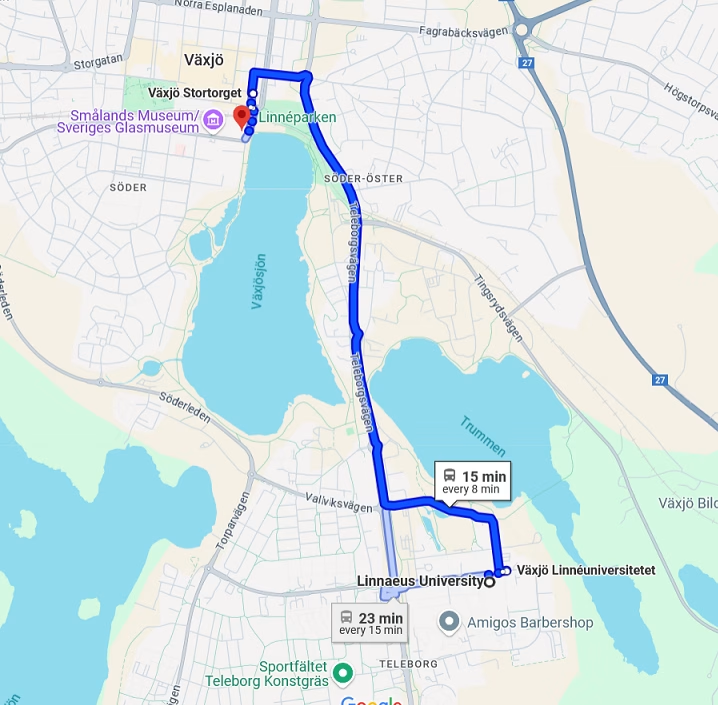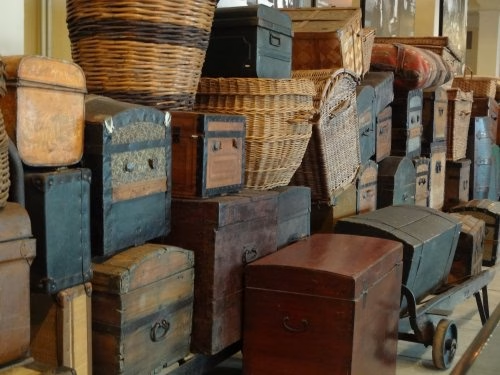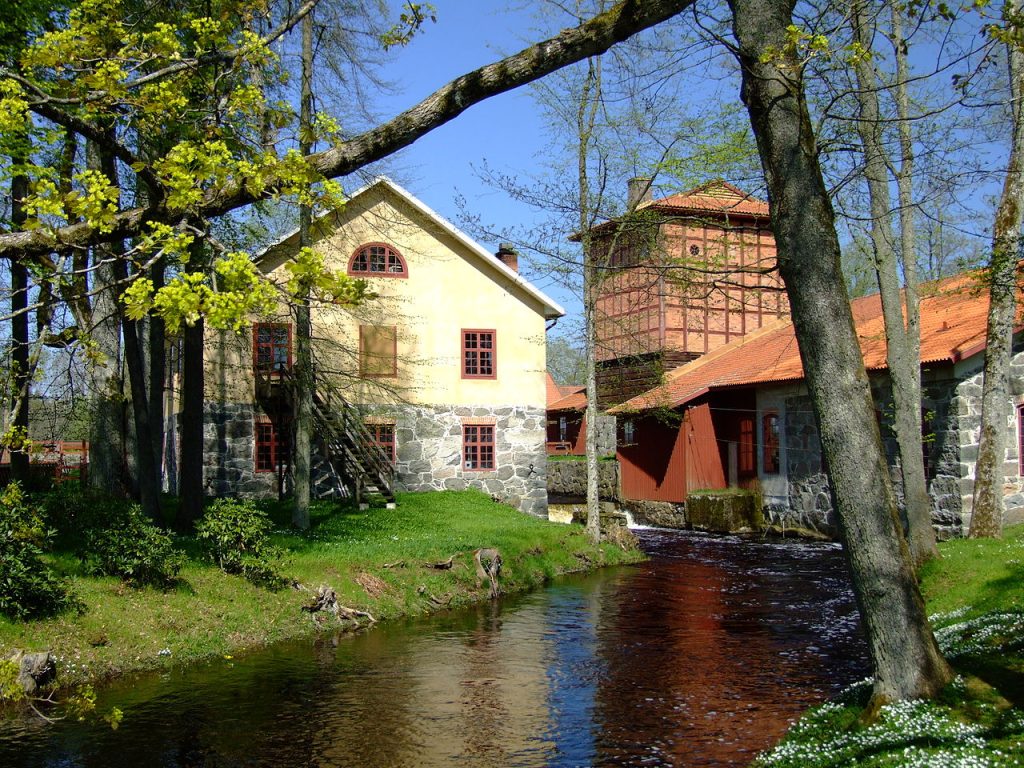Special Events
Special Events-
Opening:
Peter Aronsson: Vice chancellor and professor of history,
Stefan Amirell: Professor of global history
Katja Castryck-Naumann: President of ENIUGH
Quick Input:
Presentation Summer School
Key Note I:
Fe/derico Navarrete (Instituto de Investigaciones Históricas): Cosmohistories, the multiplicity of worlds and their
histories -
Fe/derico Navarrete (Instituto de Investigaciones Históricas): Cosmohistories, the multiplicity of worlds and their histories
Abstract
This lecture will present the concept of cosmohistory as an alternative tool for understanding the interaction between different historical worlds in the arena of what we usually call global history. It rejects the conception of world history as a singular process, a common history of the human species, a conception which frequently reflects the ethnocentric conceptions of Western societies and falls into teleological and tautological traps. According to this cosmohistorical perspective different human communities with their respective life worlds can coexist, collide, interact, even dominate each other without being fully absorbed into a single process or into a singular causal chain. The principles of relativity can be used to understand the interactions between different temporalities and cosmopolitical perspectives. The example of the interaction between Indigenous, Afrodiasporic and Western histories in the Americas will show how cosmohistory can lead to better understandings of processes such as colonialism, genocide and the so-called anthropocene, than traditional evolutionary unilinear frameworks.
Bio
Federico/Fe Navarrete is a historian, writer, and professor at the Instituto de Investigaciones Históricas of the Universidad Nacional Autónoma de México (UNAM). A non-binary scholar, Fe has spent over three decades researching the European colonization of the Americas and the responses of Indigenous and Afroamerican communities.
Navarrete is the author of numerous books, including ¿Quién conquistó México? (2019) and Malintzin, o la conquista como traducción (2021), which offer new perspectives on the so-called conquest of Mexico. A specialist in Indigenous visual histories (codices), Fe analyzes how Amerindian authors interpreted colonization and integrated Western elements into their historical narratives. In 2021, Navarrete participated in the first German edition of the Codex Mendoza.
Their research also explores the history of racism in Mexico and Latin America. The widely read essays México racista (2016) and Alfabeto del racismo mexicano (2017) have influenced national debates. Fe’s non-binary identity has deepened their focus on the intersection of racism and gender, and on deconstructing male-centered colonial narratives. Navarrete is a member of Poder Prieto, an intersectional anti-racist collective of Mexican artists and actors.
Fe is active in public history, leading projects such as Noticonquista, Pintar el Lienzo de Tlaxcala, and El racismo en el cuerpo y en el mundo. Navarrete has taught in Costa Rica, Brazil, Germany, and the United States, and is currently affiliated with the International Graduate College Temporalities of Future.
In 2022–2023, Fe was awarded the prestigious Simón Bolívar Chair at the University of Cambridge. During that time, Navarrete explored how colonial and national regimes in the Americas have relied on racialized and gendered violence, focusing on figures such as Simón Bolívar.
Fe’s latest monograph, Historia pública: El diálogo entre memorias sociales (UNAM, 2024), reflects a commitment to bridging academic research and public memory. -
- Convenor: Janne Lahti (Linnaeus University)
- Chairs: Gunlög Fur (Linnaeus University), Janne Lathi (Linnaeus University)
- Commentator: Janne Lahti (Linnaeus University)
- Panelists: Saara Alakorva (University of Lapland) Kristín Loftsdóttir (University of Iceland) Magdalena Naum (Lund University) Anders Bo Rasmussen (University of Southern Denmark)
Abstract
Traditionally Nordic –Danish, Finnish, Icelandic, Norwegian, and Swedish –understanding of the past shies away from colonial self-understandings and rejects colonial undertones as unfitting to a Nordic history, while clinging to notions of “exceptionalism.” This accepted wisdom proposes that colonialism was something that happened far away and proved inconsequential for Nordic histories. It also detaches Nordic peoples from colonial networks of settler projects, knowledge production, and material exchanges, or at least suggests that their participation shows cases of a more peaceful, benevolent colonial association. This in turn supports the Nordic countries’ self-image as harbingers of humanitarian causes. Recently, a growing number of scholars have criticized these kind of notions as self-congratulatory, misleading, and alarming. They have also started to expose the rich and complex histories of Nordic colonial involvement around the world. Scholars have examined Nordic participation in the global slave trade, settler colonialism in Sámi lands, or various forms of involvement by Nordic individuals and groups with other European empires. Some have investigated the Nordic experience and legacies in North America via the colonial lens. This panel discusses how Nordic colonialism as a set of academic inquirers and as a framework for Nordic history has gained ground, stirred debates, created opposition. It deals with the past, present, and possible futures of Nordic colonialism, on how it is forming new meanings for Nordic histories more broadly, across national boundaries in order to understand differences and similarities in the national histories of colonialism in the Nordic countries or between Nordic countries and the world.
Papers:
Saara Alakorva (University of Lapland): Entangled histories of the Sámi and the Nordic nations; Colonial legacies of the Sámi political institutions
The political institutionalization of the Sámi society is often described through a national framework. Research has focused on the role of the Sámi actors in the process of national construction as well as on the ways different political activities embody Sámi peoplehood. Articulating political interests in the name of the people inevitably creates an image of a coherent existence of the people and hence constructs nationhood. This is possible because the concept of a nation has become ubiquitous all over the world, and people use it to categorize the world and their own place within it. Although we associate a certain people or nation with a specific place or geographical area, our shared understanding of it has a cross-border nature. National symbols function on the basis of the same bipolarity: Both local and transnational meanings are attached to them. The Sámi have sought recognition as a distinct people by adopting national representations of a transnational nature. Instead of framing this process solely as a Sámi endeavour to build one unified Sámi nation, it should be examined in relation to the surrounding societies, where the hierarchical relationships between the Sámi and majorities are taken into consideration. In this presentation I draw attention to the long time-span over which the national narrative of the Sámi has evolved across multiple levels in relation to the surrounding dominant societies, while also exposing the ways in which it carries the legacy of colonialism.
Kristín Loftsdóttir (University of Iceland): Iceland an Ambiguous Contact Point
In 1856, six plaster busts were created by a French expedition in Iceland, revealing one of the many ways Iceland was intertwined with the colonial and imperial projects of 19th-century Europe. The expedition was headed by Prince Jérôme Napoléon Bonaparte—the son of Napoleon’s younger brother—to the northern seas. His journey reflected France’s combined military and scientific interests in the far North, particularly regarding resource extraction in Greenland and Iceland. These casts were displayed in Paris with other busts made during similar expeditions, intended to show different racial groups, and later replicas were sold to different museums in France and Spain. In the nineteenth century, racial science was integrated into key preoccuption of scholars, and as a field shaped by a pan-Euro-American intellectual network of scholars exchanging ideas and knowledge, in which Nordic scholars participated. It defined what it meant to be human in the most dehumanizing terms imaginable (Conklin 2013, 5).The presentation focuses on what these casts and others say as “contact points” (Loftsdóttir2024; Feldman 2006), drawing special attention to Iceland. What do the busts as contact points say about Nordic colonialism more generally, as well as the differentiated Nordic subjects within the category of the “Nordic” and their historical fluidity? What does the “unfolding” of the busts –visualizing them as folded objects (M’charek 2014) -bring into a present that is characterized by persistent notions of racism as an exception and as something belonging to the past.
Magdalena Naum (Lund University): Realities and Fantasies of Friendship in Settler Colonial Settings of North America
Museum collections in Denmark contain numerous objects brought back by settlers, explorers, and mariners from North America during the late 19th and early 20th centuries. Among them are gifts described as tokens of friendship between Danes and Indigenous peoples. These artifacts raise critical questions about the existence and nature of friendship within the unequal, violent, and racialized contexts of settler colonialism. What did it mean to be friends in such settings? Did such friendships represent genuine, reciprocal bonds, or were they merely colonial fantasies, misinterpretations of acts of reciprocity? While scholars have explored the term “friendship” in treaty contexts, pointing the very different public discourse and appropriation of the term by Indigenous and Euro-American leaders, the actual affective bonds between individual settlers and Native Americans remain largely understudied and undertheorized. Drawing on research on interracial friendships in different colonial contexts, the paper offers a reflection on the complicated, faltering and fuzzy character of such affective bonds and on methodological challenges for historical interpretation of the existence and nature of friendship between settlers and Indigenous people.
Anders Bo Rasmussen (University of Southern Denmark): New Denmark, New Nordics, and the New World. A Transnational Exploration of Settler Colonialism and Empire in Northeastern Wisconsin
The 1862 Homestead Act was the greatest redistribution of wealth in American history. Within decades more than 1,5 million households gained ownership of land that had previously belonged to indigenous nations and found renewed opportunities for social mobility. Taking the settlement of New Denmark, Wisconsin, as a starting point, this paper argues for the fruitfulness of exploring settler-indigenous relationships, and environmental consequences of Native American dispossession, in one of the richest “borderland” regions in North America. Thus, the initial focus on daily life in northeastern Wisconsin serves as a prism for understanding overlaps between “Old World” emigration, settler colonial ideas, cultural encounters, and New World racial hierarchies.”
-
We will celebrate the first evening of the congress with a cocktail reception at Utvandrarnas Hus (The House of Emigrants) sponsored by Växjö municipality. Utvandrarnas Hus will also offer guided tours for interested guests.
Participation in the cocktail reception is free, we nonetheless kindly ask you to register via our registration tool as the space at Utvandrarnas Hus does not allow more than 300 visitors at a time.


-
For members of ENIUGH only!
The general meeting of ENIUGH will be a moment to take stock of the activities since 2023 and to look ahead. Additionally, we will award the Walter Markov Prize, which honors an outstanding MA or PhD thesis that contributes to the research fields of Markov (1909–1993). Markov was an eminent world historian whose work was dedicated to the comparative exploration of revolutions, social movements, and decolonization processes in Africa, Asia, and Latin America; he also connected the multiple historiographies that seek to transcend methodological nationalism and Eurocentric perspectives.
-
Laura de Mello e Souza: Provisional Forms of Existence in Portuguese America – 16th-18th Centuries
Abstract
The occupation of a territory that today spans 8,500,000 km² was a slow and arduous process, made possible in large part by the knowledge of Indigenous peoples and enslaved Africans, both of whom were accustomed to life in predominantly tropical and subtropical regions.
An examination of daily life in the interior of this territory between the 16th and 18th centuries reveals how what I define as ‘provisional forms of existence’ were improvised and developed, blending knowledge from diverse cultural traditions: those of the Indigenous populations, Africans and their Afro-descendant heirs—whether enslaved or freedmen—and Portuguese colonisers. This study thus explores the forms and meanings of their everyday acts of incorporation and re-creation, which conferred specificity upon the society that emerged from the violent and dramatic encounter of these distinct cultures and ultimately contributed to shaping present-day Brazil.
Bio
Laura de Mello e Souza was born in São Paulo, where she spent most of her life. She earned her degree in History from the University of São Paulo (USP) in 1975. She completed her Master’s (1977–1980) and PhD (1982–1986) at the same university, under the supervision of Fernando A. Novais. She joined the Department of History at USP as a professor of Modern History in 1983 and retired in 2014, when she assumed the Chair of Brazilian History at the University of Paris-Sorbonne, concluding her teaching career in 2022. She currently continues to supervise some doctoral students in France (Sorbonne and the École des Hautes Études en Sciences Sociales/EHESS) and in Brazil (USP) and remains active in research and writing after 42 years of university teaching. She has three daughters and three granddaughters.
-
Nordglob is a network for teachers, researchers and students interested in global history and based in the Nordic countries (Sweden, Denmark, Norway, Finland and Iceland). The network organises online seminars, workshops, conferences panels and other activities intended to stimulate interest in and exchange of ideas about global history from Nordic perspectives. For more information and to join the network, please visit the Nordglob website at https://nordglob.org/.
-
To continue discussions and talks in a more relaxed atmosphere, we warmly invite you to join us for the Conference Dinner. Please note, however, that you have to register in advance and that the conference dinner is not included in the congress fee.
-
Please note that seats on the bus are limited to 30-50 people and the trip therefore requires pre-registration. If you are interested in participating, please register here by 15.08.2025.
Please also note that the fee for the trip is not included in the congress fee.
For more information on Huseby click here.
16:45 Departure by chartered bus from LNU17:15 Arrival at Huseby Bruk
17:30-18:30 Guided tour of environments and exhibition (iron furnace and manor house), incl. beverage (one wine/beer/non-alcoholic)
18:45 Departure from Huseby Bruk
19:15 Arrival LNU

-
Convenors: Birgit Tremml-Werner (Stockholm University), Daniel Laqua (Northumbria University)
Chair: Birgit Tremml-Werner (Stockholm University)
Participants:
- Katja Castryck-Naumann (Comparativ / Leipzig University)
- Daniel Laqua (History: The Journal of the Historical Association / Northumbria University)
- Erez Manela (‘Global and International History’ series at CUP / Harvard University)
- Guido van Meersbergen (Journal of Global History / Warwick University)
Abstract
The conclusion of ENIUGH allows us to take stock of our field. The roundtable will do so by considering how research in global history is shaping history publishing more broadly, tracing the impact of new directions within (and on) our discipline. The roundtable brings together editors who will approach the subject from different perspectives, reflecting the nature of their publications: journals that are specifically dedicated to global history (Comparativ, the Journal of Global History), a journal that covers a wider range of fields and sub-fields (History: The Journal of the Historical Association), and a book series (‘Global and International History’ at Cambridge University Press). The discussion will probe the way in which inclusive, multi-vocal histories can be reflected in academic journals and books, and highlight future strategies that publishers, editors and authors can deploy to this end.



